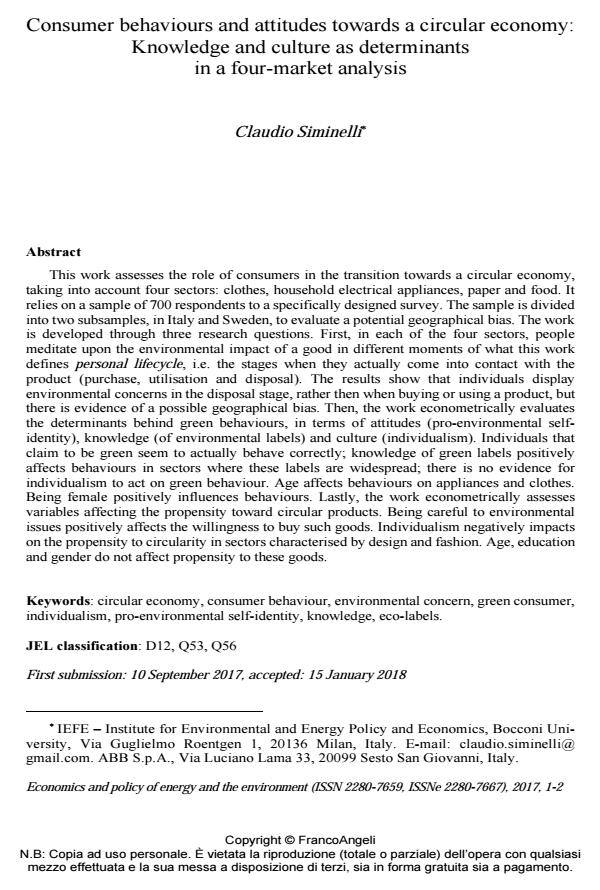Consumer behaviours and attitudes towards a circular economy: Knowledge and culture as determinants in a four-market analysis
Titolo Rivista ECONOMICS AND POLICY OF ENERGY AND THE ENVIRONMENT
Autori/Curatori Claudio Siminelli
Anno di pubblicazione 2017 Fascicolo 2017/1-2
Lingua Inglese Numero pagine 35 P. 135-169 Dimensione file 447 KB
DOI 10.3280/EFE2017-001008
Il DOI è il codice a barre della proprietà intellettuale: per saperne di più
clicca qui
Qui sotto puoi vedere in anteprima la prima pagina di questo articolo.
Se questo articolo ti interessa, lo puoi acquistare (e scaricare in formato pdf) seguendo le facili indicazioni per acquistare il download credit. Acquista Download Credits per scaricare questo Articolo in formato PDF

FrancoAngeli è membro della Publishers International Linking Association, Inc (PILA), associazione indipendente e non profit per facilitare (attraverso i servizi tecnologici implementati da CrossRef.org) l’accesso degli studiosi ai contenuti digitali nelle pubblicazioni professionali e scientifiche.
This work assesses the role of consumers in the transition towards a circular economy, taking into account four sectors: clothes, household electrical appliances, paper and food. It relies on a sample of 700 respondents to a specifically designed survey. The sample is divided into two subsamples, in Italy and Sweden, to evaluate a potential geographical bias. The work is developed through three research questions. First, in each of the four sectors, people meditate upon the environmental impact of a good in different moments of what this work defines personal lifecycle, i.e. the stages when they actually come into contact with the product (purchase, utilisation and disposal). The results show that individuals display environmental concerns in the disposal stage, rather then when buying or using a product, but there is evidence of a possible geographical bias. Then, the work econometrically evaluates the determinants behind green behaviours, in terms of attitudes (pro-environmental self-identity), knowledge (of environmental labels) and culture (individualism). Individuals that claim to be green seem to actually behave correctly; knowledge of green labels positively affects behaviours in sectors where these labels are widespread; there is no evidence for individualism to act on green behaviour. Age affects behaviours on appliances and clothes. Being female positively influences behaviours. Lastly, the work econometrically assesses variables affecting the propensity toward circular products. Being careful to environmental issues positively affects the willingness to buy such goods. Individualism negatively impacts on the propensity to circularity in sectors characterised by design and fashion. Age, education and gender do not affect propensity to these goods.
Parole chiave:Circular economy, consumer behaviour, environmental concern, green consumer, individualism, pro-environmental self-identity, knowledge, eco-labels
Jel codes:D12, Q53, Q56
- The Role of Consumers in Transitioning to a Circular Economy Kiana Keshavarz, Maria Jesus Alvarez, Carmen Jaca Garcia, in Circular Economy and Sustainability /2025 pp.4271
DOI: 10.1007/s43615-025-00617-0 - Editorial: The prospects of the circular economy in Europe Alfonso Marino, Paolo Pariso, in European Business Review /2025 pp.933
DOI: 10.1108/EBR-10-2025-405 - How fashion can achieve sustainable development through a circular economy and stakeholder engagement: A systematic literature review Chung‐Wha (Chloe) Ki, Sze Man Chong, Jung E. Ha‐Brookshire, in Corporate Social Responsibility and Environmental Management /2020 pp.2401
DOI: 10.1002/csr.1970 - Towards zero waste: circular behaviors in Polish university student households Justyna Trippner-Hrabi, Jacek Chądzyński, Pamela Jeziorska-Biel, Ewa Szafrańska, in Acta Scientiarum Polonorum Administratio Locorum /2025 pp.469
DOI: 10.31648/aspal.11075 - Management, Tourism and Smart Technologies Lucero Nicole Huerta-Tantalean, Nataly Alexis Carrasco-Carrasco, Maria Eugenia Castillo-Silva, Franklin Cordova-Buiza, Wilver Auccahuasi, pp.60 (ISBN:978-3-031-43732-8)
- Effect of Social Media Determinants on Consumer Behaviour in the Circular Economy (CBCE): Empirical Study from Saudi Arabia Saad Almosa, in Circular Economy and Sustainability 41/2026
DOI: 10.1007/s43615-026-00732-6 - Assessing the impact of public digitalization on sustainability: the mediating role of technological innovation in the context of the EU Mohammed Ibrahim Gariba, Emmanuel Ebo Arthur, Samuel Amponsah Odei, in Discover Sustainability 204/2024
DOI: 10.1007/s43621-024-00397-x - Perspectives and Trends in Education and Technology, Volume 3 Tania Morales-Molina, Diana Morales-Urrutia, Oscar Fernando Ibarra Torres, Silvia-Melinda Oyaque-Mora, Patricio Córdova, pp.314 (ISBN:978-3-032-09073-7)
Claudio Siminelli, Consumer behaviours and attitudes towards a circular economy: Knowledge and culture as determinants in a four-market analysis in "ECONOMICS AND POLICY OF ENERGY AND THE ENVIRONMENT" 1-2/2017, pp 135-169, DOI: 10.3280/EFE2017-001008